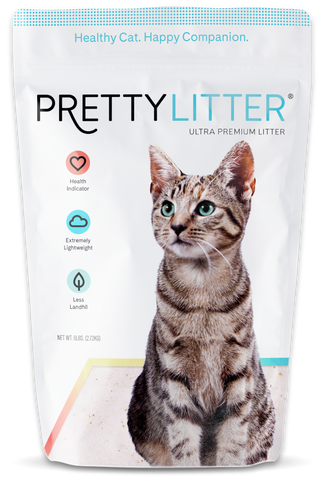May 29, 2019 |6 min read
Living With a Bipolar Cat: Crazy Kitties & How They Got That Way

Written by

One minute your fur baby is happy as a clam and the next she’s climbing the curtains. Your crazy kitty may be all over the place, but that doesn’t mean you have a bipolar cat.
It may mean you should take a look at the crazy cat lady in the mirror though.
According to a study in the Journal of Veterinary Behavior, cats can develop personality traits similar to their pet parents. Monkey see, monkey, do.
Or, in this case, kitty see, kitty do.

Your cat’s neurotic behavior could be a sign of something going on in your fur baby’s brain or it could just be time for you to reflect on your own odd ways.
Do You Have a Bipolar Cat?
Cats are notoriously moody. Your feline can go from playful cuddles to sullen glances in no time. But just because she’s temperamental and neurotic doesn’t mean she’s bipolar.
According to the Mayo Clinic, bipolar disorder in humans is a serious mental health condition characterized by dramatic swings between states of depression and states of elation or mania.
While it makes sense to try and define our fur baby’s crazy behaviors in terms that we use for our own human mental health, a bipolar cat isn't common or easily diagnosed — especially given how fickle most felines tend to be in general.
Your cat's odd behavior doesn’t mean that your kitty can’t be like you, though. In fact, the longer you live with your cat, the more like you they become. Excessive grooming, anyone?
Cat Litter That Prioritizes Their
Health & Your Happiness.
for 20% Off + a FREE Catnip Toy
Is Your Kitty Copying You?
Our fur babies are apart of our families. Our cat kids even adapt their lifestyles and personality traits to match their pet parents. They just don’t want us to know how cool they think we are. Typical.
Cats learn where we put the food and litter box, when we plan to feed them, and even how to open the cabinets we leave slightly open – sneaky felines.
The author of the previously mentioned study in the Journal of Veterinary Behavior said, "cats' food intake is associated with that of owners, perhaps explaining why human and cat obesity rates seem to match so often. Cats may even match their elimination patterns with those of their owners.”
In other words, cats often mirror their owners' behavior, which can lead to some entertaining results. Who doesn’t want a little company in the bathroom?
According to another study in Applied Animal Behavior Science (AABS), many kitty traits such as being arrogant, social, aggressive, calm, timid, excitable, dominant, and curious are true in their humans, as well.
The researchers at AABS believe the environment in which a cat lives is a possible explanation for the variety of behaviors in domestic cats.
Think about that the next time you find your cat throwing judgmental looks at the new neighbors.
Why Else Would My Cat Be Acting Crazy?
Matching your weirdness isn’t the only reason your cat could seem a little neurotic. There're some medical conditions for pet parents to be aware of when monitoring their fur babies’ crazy antics.
Thyroid Problems
Feline hyperthyroidism is a disorder that results from excessive thyroid hormones. Among its many symptoms are anxiety and nervousness.
Cognitive Dysfunction
Older fur babies — especially those over 10 years old — can begin to experience cognitive dysfunction or problems relating to their brain aging.
According to the Cornell University College of Veterinary Medicine, signs include:
- Spatial disorientation
- Wandering away from home into unfamiliar territory
- Lack of interest in playing
- Excessive sleeping
- Altered cycles of sleep and wakefulness
- Long periods of staring blankly into space or at walls
- Indifference to food and water; urinating and defecating outside the litter box
- Seemingly unprompted episodes of loud vocalizing
These signs can also point to a neurological disorder, so talk to your vet if you have concerns or questions.
Anxiety, Depression & OCD
While having a bipolar cat is uncommon, felines can experience mental health issues including anxiety, depression, and obsessive compulsive disorder (OCD).

Your cat may even develop anxiety or depression as a result of you suffering from the condition. Cats can sense when their pet parents are nervous or sad. They interpret this as a sign that something is wrong, so they too may become anxious or depressed.

What Is Normal Anyway?
Just as in pet parents, our fur babies have a wide spectrum of what we consider “normal.” No two cats are exactly alike. They each have their own weird quirks — which inevitably makes them more lovable.
Also, some traits we may view as neurotic in humans are actually quite common for our feline friends.
For instance, when your kitty scratches up your favorite piece of furniture or chews on the houseplants, it's not because she's trying to be vindictive or drive you nuts. She's simply following her natural inclinations as a feline.
Unfortunately, some of those natural needs are a bit destructive and disruptive to our homes and may seem...well...crazy!
Do you have a crazy cat in your home? Tell us about her in the comments below!








